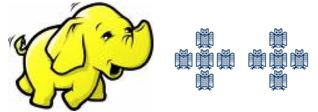From the webpage:
Hadoop++: Nowadays, working over very large data sets (Petabytes of information) is a common reality for several enterprises. In this context, query processing is a big challenge and becomes crucial. The Apache Hadoop project has been adopted by many famous companies to query their Petabytes of information. Some examples of such enterprises are Yahoo! and Facebook. Recently, some researchers from the database community indicated that Hadoop may suffer from performance issues when running analytical queries. We believe this is not an inherent problem of the MapReduce paradigm but rather some implementation choices done in Hadoop. Therefore, the overall goal of Hadoop++ project is to improve Hadoop’s performance for analytical queries. Already, our preliminary results show an improvement of Hadoop++ over Hadoop by up to a factor 20. In addition, we are currently investigating the impact of a number of other optimizations techniques.
HAIL (Hadoop Aggressive Indexing Library) is an enhancement of HDFS and Hadoop MapReduce that dramatically improves runtimes of several classes of MapReduce jobs. HAIL changes the upload pipeline of HDFS in order to create different clustered indexes on each data block replica. An interesting feature of HAIL is that we typically create a win-win situation: we improve both data upload to HDFS and the runtime of the actual Hadoop MapReduce job. In terms of data upload, HAIL improves over HDFS by up to 60% with the default replication factor of three. In terms of query execution, we demonstrate that HAIL runs up to 68x faster than Hadoop and even outperforms Hadoop++.
Isn’t that a cool aggressive elephant?
But before you get too excited, consider:
Towards Zero-Overhead Adaptive Indexing in Hadoop by Stefan Richter, Jorge-Arnulfo Quiané-Ruiz, Stefan Schuh, Jens Dittrich.
Abstract:
Several research works have focused on supporting index access in MapReduce systems. These works have allowed users to significantly speed up selective MapReduce jobs by orders of magnitude. However, all these proposals require users to create indexes upfront, which might be a difficult task in certain applications (such as in scientific and social applications) where workloads are evolving or hard to predict. To overcome this problem, we propose LIAH (Lazy Indexing and Adaptivity in Hadoop), a parallel, adaptive approach for indexing at minimal costs for MapReduce systems. The main idea of LIAH is to automatically and incrementally adapt to users’ workloads by creating clustered indexes on HDFS data blocks as a byproduct of executing MapReduce jobs. Besides distributing indexing efforts over multiple computing nodes, LIAH also parallelises indexing with both map tasks computation and disk I/O. All this without any additional data copy in main memory and with minimal synchronisation. The beauty of LIAH is that it piggybacks index creation on map tasks, which read relevant data from disk to main memory anyways. Hence, LIAH does not introduce any additional read I/O-costs and exploit free CPU cycles. As a result and in contrast to existing adaptive indexing works, LIAH has a very low (or invisible) indexing overhead, usually for the very first job. Still, LIAH can quickly converge to a complete index, i.e. all HDFS data blocks are indexed. Especially, LIAH can trade early job runtime improvements with fast complete index convergence. We compare LIAH with HAIL, a state-of-the-art indexing technique, as well as with standard Hadoop with respect to indexing overhead and workload performance. In terms of indexing overhead, LIAH can completely index a dataset as a byproduct of only four MapReduce jobs while incurring a low overhead of 11% over HAIL for the very first MapReduce job only. In terms of workload performance, our results show that LIAH outperforms Hadoop by up to a factor of 52 and HAIL by up to a factor of 24.
The Information Systems Group, Saarland University, Prof. Dr. Jens Dittrich is a place to watch.

